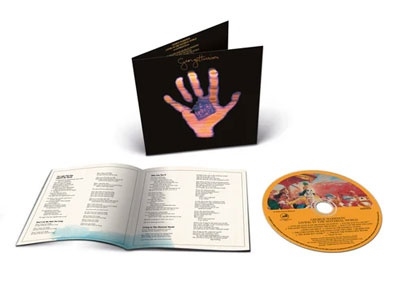ビートルズ解散後の2枚目となる73年のソロ作が50周年を祝ってリイシュー。『All Things Must Pass』ほどの絶対的な評価とは無縁ながら、シングル"Give Me Love(Give Me Peace On Earth)"と揃って全米1位を獲得した文句ナシのヒット作であり、当時の精神性が簡素な音作りで描かれた傑作に他ならない。妻オリヴィアと愛息ダーニが監修した今回は、オリジナルテープから全曲を名エンジニアのポール・ヒックスが再ミックス。
bounce (C)出嶌孝次
vol.492(2024年11月25日発行号)掲載(2024/11/25)
ザ・ビートルズ解散後のジョージ・ハリスンによるオリジナル曲の2枚目のソロ・アルバム
50周年を迎えた『Living in the Material World』のアニバーサリー・エディション。
1973年5月の発売からわずか5週間でこのアルバムとシングル「Give Me Love (Give Me Peace On Earth)」は全米アルバム・チャートとシングル・チャートで同時のトップの座を占めた。
DhaniとOlivia Harrisonが愛情を込めて監修した本作は、オリジナル・テープから完全リミックス。50周年記念リリースの素晴らしい作品となった。
3度のグラミー賞を受賞したエンジニア、Paul Hicksによるリミックスはアルバムの音質をさらに向上させ、これまで以上に明るく豊かでダイナミックなサウンドを実現している。
■Standard 1CD - 4P見開き紙ジャケット/12Pブックレット
発売・販売元 提供資料(2024/09/20)
How does an instant multimillion-selling album become an underrated minor masterpiece? George Harrisons follow-up to the triple-disc All Things Must Pass (which had been comprised of an immense backlog of great songs that hed built up across the last years of his time with the Beatles), Living in the Material World was necessarily a letdown for fans and critics, appearing as it did two-and-a-half-years after its predecessor without that earlier albums outsized songbag from which to draw. And it does seem like Harrison narrowed his sights and his vision for this record, which has neither the bold musical expansiveness nor the overwhelming confidence of its predecessor. And while there are still some beautiful and delightfully lyrical, charming moments throughout, few of the melodies are as instantly memorable and compelling as those of most of the songs on the earlier record, and some of the most serious songs here, such as "The Light That Has Lighted the World," seem weighed down with their own sense of purpose, in ways that All Things Must Pass mostly (but not entirely) avoided. What Living in the Material World does show off far better than the earlier record, however, is Harrisons guitar work -- unlike the prior album, with its outsized contingent of musicians including Eric Clapton and Dave Mason on guitars, hes the only axeman on Material World, and it does represent his solo playing and songwriting at something of a peak. Most notable are his blues stylings and slide playing, glimpsed on some of the later Beatles sessions but often overlooked by fans.
"Dont Let Me Wait Too Long" is driven by a delectable acoustic rhythm guitar and has a great beat. The title track isnt great, but it does benefit from a tight, hard, band sound, and "The Lord Loves the One (That Loves the Lord)," despite its title, is the high point of the record, a fast, rollicking, funky, bluesy jewel with a priceless guitar break (maybe the best of Harrisons solo career) that should have been at the heart of any of Harrisons concert set. Vocally, Harrison was always an acquired taste, and he isnt as self-consciously pretty or restrained here, but it is an honest performance, and his singing soars magnificently in his heartfelt performance on "The Day the World Gets Round," a song that resembles "Beware of Darkness" and also, curiously enough, "Across the Universe." Perhaps a less serious title would have represented the album better, but nobody was looking for self-effacement from any ex-Beatle except Ringo (whos also here, natch) in those days. Even in the summer of 1973, after years of war and strife and disillusionment, some of us were still sort of looking -- to borrow a phrase from a Lennon-McCartney song -- or hoping to get from them something like "the word" that would make us free. And George, God love him, had the temerity to actually oblige, to the extent of painting a few signs here and there suggesting where hed found it and where we might, all with some great playing and some laughs. And it wasnt all serious -- there are pointed moments of humor throughout, especially on the title song; and "Sue Me, Sue You Blues" was a follow-up to Beatles-era tracks such as "Only a Northern Song," dealing with the internal workings and business side of his lingering involvement with the group, in this case the multiple, overlapping, sometimes rotating lawsuits that attended the breakup of their organization. And one track, "Try Some, Buy Some," which hed given away to Ronnie Spector at the time, actually dated back to the All Things Must Pass sessions. ~ Bruce Eder
Rovi



